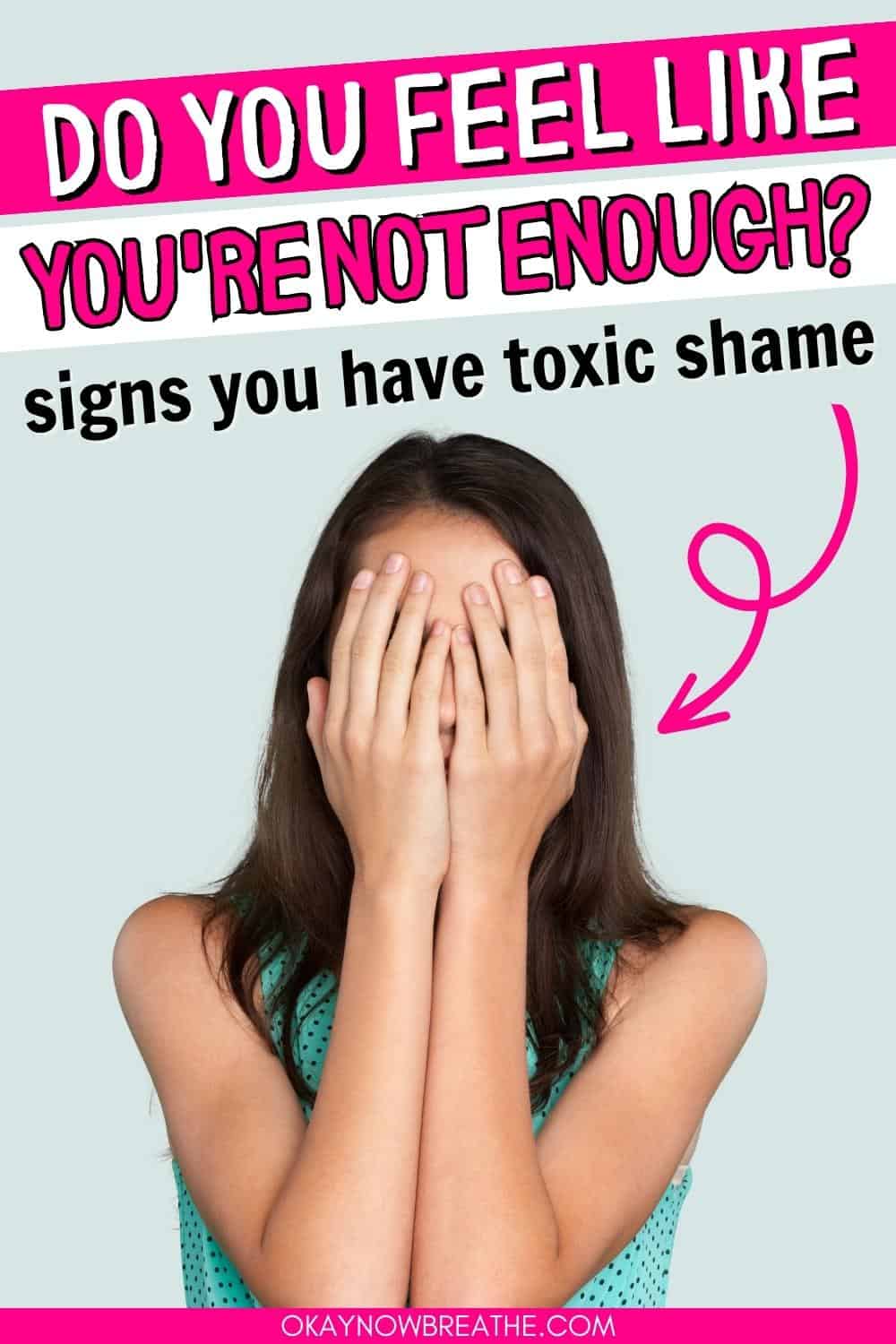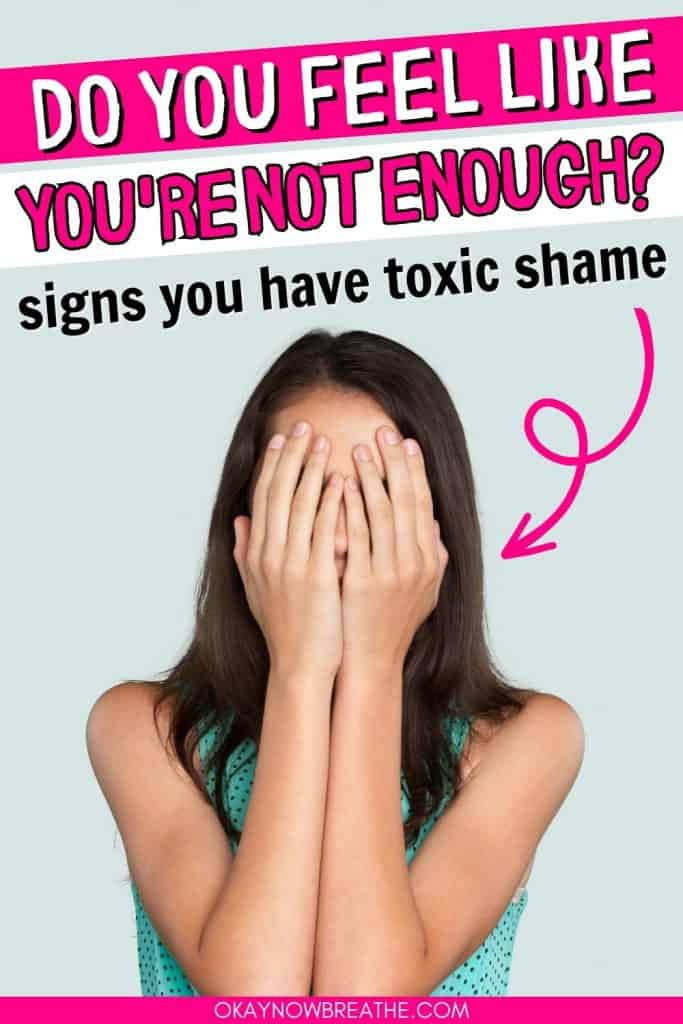
DISCLOSURE: I am not a mental health professional. If you need help finding a mental health care provider, call 1-800-662-HELP (4357) or visit Online Therapy to call, message, or video chat a certified therapist online. This post contains affiliate links. As an Amazon Associate, I earn from qualifying purchases. I may also receive compensation from Online Therapy or other sources if you purchase products or services through the links provided on this page. You can read my full disclaimer.
Signs of Shame in a Person
The signs of shame in a person are not always easily identifiable, but they sure make a negative impact on a person’s emotional and physical wellbeing.
Maybe you’ve spent the last several years of your life believing you were a failure, unworthy, ugly, and stupid.
But the reality is, you’ve most likely lived with chronic (or toxic) shame most of your life.
WHAT IS SHAME?
Shame is a highly complex emotion that’s often associated with feelings of inadequacy, unworthiness, and self-doubt.
These overwhelming feelings can be triggered by a variety of factors, such as past experiences, parental and societal expectations, and personal beliefs.
The worst reality about living with shame is that it can cause deep depression and low self-esteem.
Heal with these shame affirmations:
👉 101 Affirmations for Shame (to Forgive and Accept Yourself)
Normal shame vs. toxic shame
Shame is a normal human emotion that tells us we’ve done something embarrassing and feel shameful.
We usually go on to fix our behavior, apologize for our mistakes, and eventually move forward.
Toxic shame, however, is a chronic sense of unworthiness and low self-esteem that often originates in childhood and when you’re a teenager.
Shame versus guilt
While shame can sometimes bring upon feelings of guilt, they’re not necessarily the same thing.
Guilt is a feeling of remorse or regret for something you’ve done that was a mistake or that hurt someone else.
Shame, on the other hand, is a painful feeling of inadequacy or unworthiness as a person.
Shame attacks your character, your personality, and who you are.
WHAT CAUSES SHAME?
Shame can be caused by a variety of factors
Causes of toxic shame ⤵️
💔 Past traumatic experiences
💔 Societal pressure or cultural norms
💔 Parental expectations
💔 Personal beliefs and values
💔 Internalized negative messages or criticisms
💔 Fear of judgment or rejection from others
When shame is chronic, it can feel like there’s something fundamentally wrong with you (which is so, so not true!)
If you’re experiencing deeply rooted shame, speaking with a mental health professional might heal your soul.
Speaking of healing shame, have you downloaded your free inner child healing workbook yet? 👇

Now let’s see how many of these signs of shame you relate to…
18 Symptoms of Shame
(It’s important to remember that everyone experiences shame differently, and not all people who exhibit these signs are necessarily experiencing shame.)
EMOTIONAL SYMPTOMS OF SHAME
Shame carries a lot of emotional symptoms, such as:
Feeling Self-Conscious
Living with shame most likely means you’re a self-conscious person.
You can see flaws within your personality, your body, and your intelligence.
You might even compare yourself to others and have an overall feeling of inadequacy and inferiority.
Feeling Worthless
When you experience shame, you might feel like you’re not good enough, that you don’t deserve love or respect, and that you’re a failure.
You might also feel like you’re a burden to others and that you’re unworthy of their attention and care.
These feelings of worthlessness can be overwhelming and can lead to a negative self-image — and can conjure up a lot of negative self-talk.
Combat negative self-talk with self-love:
👉 100 Daily Self-Love and Self-Esteem Affirmations to Love Yourself Better
Having Intense Guilt
You might feel overwhelming guilt for things that you’ve done in the past — even if you’ve already apologized and made amends.
You might also feel guilty for things that aren’t your fault or for things that you have no control over.
This guilt can be so all-consuming that it can lead to feelings of self-blame and self-hatred.
Feeling Extreme Loneliness
Because people with shame tend to self-isolate, it can lead to intense loneliness.
Shame can be debilitating and can affect your relationships, self-esteem, and overall wellbeing.
Feeling like you don’t belong is a common sign of shame, so you might tend to push people away.
Cope with loneliness:
👉 13 Super Reliable Ways to Cope with Severe Loneliness
BEHAVIORAL SIGNS OF SHAME
When someone experiences shame, it can manifest in their behavior in various ways.
Here are some common behavioral signs of shame:
Comparing Yourself to Others
It’s almost a given that when you live with shame, you tend to compare yourself to other people.
You might find yourself constantly comparing yourself to your peers, siblings, and strangers.
But when you make these comparisons of yourself with others, you are often putting yourself down.
Did your parents compare you to others?
👉 10 Signs Your Parents Play Favorites (and Why it Freaking Sucks)
Being Defensive
When you feel shame, you might become defensive or angry when questioned or criticized.
This means you might feel like you’re under attack and become sensitive to any perceived criticism.
You might also try to shift the blame onto other people or make excuses for your behavior as a form of self-protection.
Being a Perfectionist
Because you might feel like you have to be perfect to avoid criticism or judgment, perfectionism is often an effect of shame.
You might set impossibly high standards for yourself and become overly self-critical when you don’t meet them.
This only perpetuates the vicious shame and inadequacy cycle.
You might find these TED Talks relatable:
👉 13 TED Talks on Childhood Trauma (to Heal Your Inner Child)
Procrastinating
You might avoid doing things, because you’re scared you won’t be good enough.
You might procrastinate and put off important tasks or refuse to take risks, because you’re afraid of being judged or rejected.
But this can lead to even more feelings of shame and guilt.
Seeking Constant Reassurance
Shame can cause you to compare yourself to others, and it feels vital to get outside validation.
This can make you constantly seek reassurance from others that you’re good enough, beautiful enough, and worthy enough.
Seeking outside validation often leads people to become codependent.
Withdrawing From Others
On the other hand, withdrawing from people is another common reaction to feelings of shame.
When you experience shame, you might feel like hiding or avoiding others — even though it can lead to isolation and loneliness.
You might also feel like you’re a bad person or that you’ve failed in some way.
Are you withdrawing because of shame?
👉 10 Shame Healing Exercises (for Inner Childhood Wounds)
Being Overly Apologetic
Due to shame, you might find yourself repeatedly feeling like you failed and disappointed others.
The worse part is you might even find yourself saying sorry for no reason, such as when you speak your opinion.
But remember your voice matters, and you are not a failure.
Lacking boundaries
When you live with toxic shame, you don’t think you’re good enough.
This can, unfortunately, cause you to not feel worthy of having healthy boundaries
But it’s important to recognize that having no boundaries and being a people pleaser is not going to eliminate your shame.
Do you lack boundaries?
👉 7 Self-Care Boundaries (to Finally Start Putting Yourself First)
Dissociating
Your shame can get so bad that you might find yourself dissociating.
You might experience moments when you feel disconnected from your body.
Dissociation and shame can even make you feel like the world around you isn’t real.
PHYSICAL SYMPTOMS OF SHAME
Shame isn’t just an emotional and behavioral experience.
It can also manifest in physical ways, such as:
Avoiding Eye Contact
When you feel ashamed, you might look down at the ground or off to the side instead of making eye contact.
This is because maybe you feel like you don’t deserve to look others in the eye.
However, this can make it difficult for others to connect with you or understand what you’re feeling.
Read these quotes to gain confidence:
👉 83 Inspiring Self-Doubt Quotes (to Push Past Limiting Beliefs and Build Confidence)
Physical Discomfort
Shame can also cause uncomfortable physical sensations.
You might feel too hot or too cold, your heart rate might increase, and you might start to sweat.
You also might experience body aches and brain fog.
Blushing
When you blush due to feeling ashamed, you might endure even more shame.
But blushing is a natural physical response to embarrassment, shame, or shyness.
It occurs when blood vessels in the face dilate, causing the skin to turn red.
Healing from your childhood:
👉 11 Ways to Heal Childhood Trauma Spiritually (and Awaken Your Inner Child)
Sweating
Excessive sweating can be brought upon by shame, and it can also increase your feelings of shame.
Sweating is caused by the activation of the sympathetic nervous system, which triggers the release of sweat from the sweat glands.
There’s nothing shameful about the natural human response of sweating.
Slumping Posture
Another physical sign of shame is a submissive posture.
When you feel ashamed, you might hunch your shoulders or slouch, or you might cross your arms or legs to make yourself smaller.
This posture can communicate to others that you feel vulnerable or unworthy.
WHERE IS SHAME STORED IN THE BODY?
Since shame is such a complex emotion, it’s experienced and expressed differently by everyone.
However, shame is said to be physically felt in the body.
Shame is held in the body ⤵️
- Sense of heat
- Tightness or heaviness in chest
- Body aches
- Headaches
Doing chakra work can help relieve some of this stored shame.
SIGNS OF SHAME IN A PERSON
As we’ve covered, everyone experiences shame differently.
However, if you notice these 18 signs of shame in yourself (or someone else), it can be a signal that shame is present and needs to be addressed.
It’s important to remember that shame is a normal human emotion, and it’s crucial to work through it in a healthy way.
Remember, you are not alone, and there is no shame in seeking help.
A therapist can help you identify the underlying causes of your shame — which might be childhood trauma — and develop strategies to manage it.
Related posts for your inner child:
- 10 Shame Healing Exercises (for Inner Childhood Wounds)
- 101 Affirmations for Shame (to Forgive and Accept Yourself)
- 70 Healing Inner Child Quotes (to Help Overcome Childhood Trauma)
- 107 Toxic Parents Quotes (When Mother and Father Are Abusive AF)
- 40 Child Abuse Songs (When You Had a Bad Childhood)
- 17 Magical Crystals for Healing Childhood Trauma (and Emotional Pain)
- 13 Nostalgic Activities to Reconnect with Your Inner Child
- 21 Powerful Inner Child Healing Meditations (Guided and Unguided)
- 23 Heartbreaking Movies About Childhood Trauma (That are Therapeutic)
- 13 Inner Child Healing Exercises (for Your Wounded Younger Self)
- 17 Must-Have Healing Gifts for Your Inner Child
- 11 Ways to Heal Childhood Trauma Spiritually (and Awaken Your Inner Child)
- 23 Inner Child Oracle Cards (for Deep Shadow Work)
- 23 Tarot Decks (for Intense Inner Child Work)
Did you know there’s online therapy?
Online Therapy is a complete online therapy toolbox.
Your therapy toolbox includes:
-
- Live video, voice, or text chat session with your therapist
- 8 easy-to-follow sections, including 25 worksheets
- Activity plan, journal, and tests
- Yoga and meditation videos
What I love about Online Therapy is that there are several life-changing options and therapists available, and you don’t even have to leave the comfort of your home.
This means you never need to worry before getting help.
Get 20% off your first month with my exclusive link.

